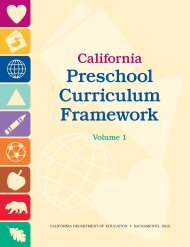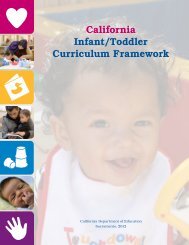California Preschool Learning Foundations - ECEZero2Three ...
California Preschool Learning Foundations - ECEZero2Three ...
California Preschool Learning Foundations - ECEZero2Three ...
Create successful ePaper yourself
Turn your PDF publications into a flip-book with our unique Google optimized e-Paper software.
SOCIAL-EMOTIONAL DEVELOPMENT<br />
26<br />
sist in circumstances in which they are<br />
unlikely to succeed. This orientation<br />
can, under some circumstances, result<br />
in a learned helplessness orientation<br />
in which children tend to give up after<br />
failing because they do not have confidence<br />
in their ability to succeed. In<br />
contrast, children with a “learning (or<br />
mastery) orientation” focus on efforts<br />
that increase their ability. These children<br />
will be more likely to tackle difficult<br />
challenges if they can foster new<br />
learning (even if their initial efforts<br />
result in failure) and are more likely<br />
to persist until they are successful.<br />
This is the kind of learning orientation<br />
that best predicts classroom achievement.<br />
These differences in learning<br />
orientation are readily observed<br />
among primary grade students, but<br />
there is evidence that they are present<br />
among older preschoolers as well<br />
(see Burhans and Dweck 1995; Smiley<br />
and Dweck 1994). Research by Dweck<br />
and her colleagues indicates that these<br />
differences arise from many influences,<br />
including the kinds of reactions<br />
by parents and teachers to children’s<br />
achievement successes and failures<br />
that emphasize the child’s intrinsic<br />
ability and strong effort.<br />
The research on learning orientations<br />
focuses on individual differences<br />
among children of a given age. But<br />
there are also developmental differences<br />
in preschool children’s initiative<br />
in learning, with younger children<br />
being more likely to approach new<br />
Young children’s natural curiosity,<br />
interest, and self-confidence that they<br />
can discover the answers to their<br />
questions are a central component<br />
of their capacities to benefit from<br />
learning opportunities.<br />
learning situations with enthusiasm<br />
and self-confidence but not necessarily<br />
with persistence in confronting difficult<br />
problem-solving situations. In contrast,<br />
older children are more active<br />
learners who are more persistent but<br />
who are also more likely to be creative<br />
problem solvers, proposing their own<br />
ideas and approaching new learning<br />
opportunities with initiative and<br />
involvement (see Committee on Early<br />
Childhood Pedagogy 2001; The Role of<br />
Interest in <strong>Learning</strong> and Development<br />
1992; Renninger and Wozniak 1985;<br />
Flavell, Miller, and Miller 2001).<br />
Social Interaction<br />
Interactions with Familiar<br />
Adults<br />
Young children regularly interact<br />
with familiar adults in preschool<br />
and other early childhood settings.<br />
Although these adults are not attachment<br />
figures, and children’s relationships<br />
with them are not necessarily<br />
sources of security and support, a<br />
child’s ability to interact competently<br />
with familiar adults is important to<br />
social competence and the ability to<br />
obtain the assistance the child needs.<br />
The ability to interact with other adults<br />
is important also to school success<br />
because children in kindergarten and<br />
the primary grades must interact with<br />
many adults other than their teachers.<br />
With the primary focus of developmental<br />
research on young children’s<br />
establishment and maintenance of<br />
close relationships, scientists have<br />
devoted considerably less attention to<br />
the growth of social skills relevant to<br />
interacting with familiar adults (see<br />
Durkin 1995 for a general source).<br />
The relevant research offers a por-<br />
<strong>Preschool</strong> <strong>Learning</strong> <strong>Foundations</strong>, Volume 1 • <strong>California</strong> Department of Education
















